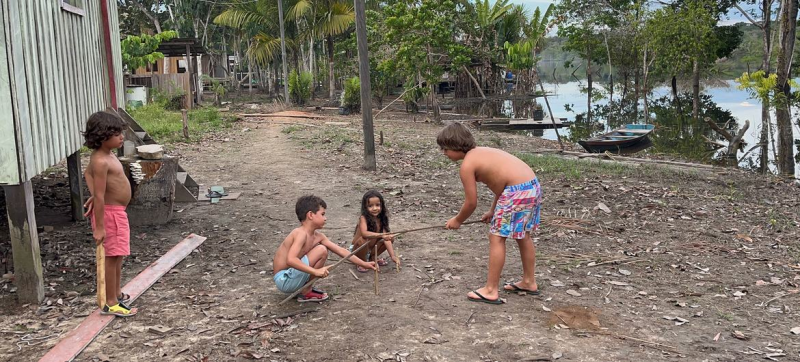- Prof Yunus expresses solidarity with Shahidul Alam and Gaza |
- Tk 38-cr Rangpur women’s sports complex now grazing ground! |
- 70 Dead in Gaza as Trump Urges Israel to Halt Strikes |
- A welcome rare momentum to reach a permanent ceasefire in Gaza |
Climate Change Could Push Millions of Latin American Children Into Poverty

Children play on the banks of the River Negro, a tributary of the Amazon River in northwestern Brazil.
Climate change could push at least 5.9 million more children and young people in Latin America and the Caribbean into poverty by 2030 unless governments act now.
Even worse, the number could triple if countries do not meet their commitments to reduce greenhouse gas (GHG) emissions and ensure that climate financing prioritises social and climate resilience services for children.
The finding comes from a report by the UN Economic Commission for Latin America and the Caribbean (ECLAC) and the UN Children’s Fund (UNICEF), published on Thursday in Panama.
The report examines the potential effects of extreme weather events on increasing poverty among children and youth, along with national efforts to reduce GHG emissions and strategies to adapt and reduce losses and damage caused by climate change.
The 5.9 million figure represents the most optimistic scenario. However, if governments are slow to implement mitigation and adaptation actions, as well as measures for loss and damage, the number could reach 17.9 million.
Roberto Benes, UNICEF Regional Director for Latin America and the Caribbean, said that children and adolescents bear the greatest burden of climate change. Their developing bodies are more vulnerable to cyclones, heatwaves, and other extreme phenomena, which also disrupt their families’ livelihoods and education.
“If children and young people don’t have the resources to meet their basic needs and develop their potential, and if adequate social protection systems are not in place, the region’s inequalities will only be perpetuated,” he said.
Despite their vulnerability, climate finance does not prioritise resilient services for health, nutrition, education, water, and sanitation that children and young people need to ensure their cognitive and physical development.
In Latin America and the Caribbean, only 3.4 per cent of all multilateral climate finance is dedicated to children, the report noted. This comes amid funding cuts and reduced development aid during a time of unprecedented needs.
The report recommends that regional governments strengthen the climate resilience of social services and critical infrastructure to better protect children and youth, particularly during the first 1,000 days of life.
Authorities are urged to increase child-sensitive climate policy financing, with actions that specifically target the needs of children at different ages. They must also promote climate awareness, education, empowerment, and participation of children and youth, including environmental and climate education in school curricula and programmes.
The report further recommends promoting adaptive social protection and emergency response policies that account for the specific needs of children and adolescents.

